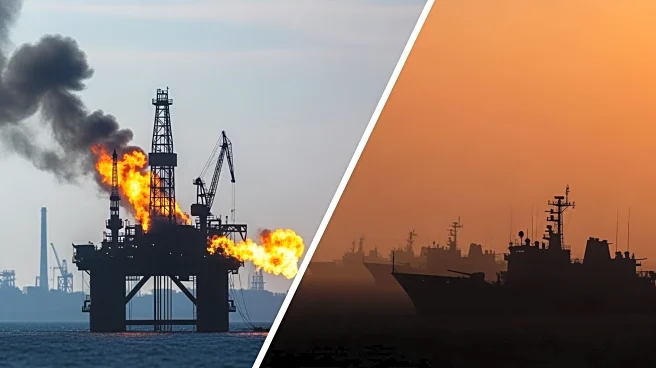What's Happening?
The United Kingdom has imposed new sanctions on Russia's largest oil companies, Lukoil and Rosneft, as well as 44 tankers within Russia's shadow fleet. These measures aim to tighten energy sanctions and reduce
Kremlin revenues, which are crucial for funding its war in Ukraine. The sanctions include asset freezes, transport restrictions, and bans on British trust services. Additionally, the UK is pressuring companies in third countries, such as India and China, that facilitate Russian oil sales. The sanctions also target Chinese refiner Shandong Yulong Petrochemical and several port operators in Shandong, China.
Why It's Important?
These sanctions are significant as they directly impact Russia's ability to export oil, a major source of revenue for the Kremlin. By targeting the shadow fleet, the UK aims to disrupt the transportation and insurance of Russian oil, forcing more trade to rely on non-Western services. This move could destabilize global energy markets and increase costs for businesses and consumers, as warned by Russia's embassy in London. The sanctions reflect ongoing geopolitical tensions and the West's efforts to isolate Russia economically, potentially affecting global oil supply and prices.
What's Next?
The sanctions are likely to push Russian oil trade further into the shadow fleet, which uses non-Western insurance and services. However, this fleet faces challenges as some ports in China and India have refused to unload tankers from the shadow fleet. The UK, along with the US and EU, may continue to target this network to limit Russia's oil exports. The situation could lead to increased scrutiny and pressure on countries and companies that continue to engage with Russian oil, potentially reshaping global energy trade dynamics.
Beyond the Headlines
The sanctions highlight the complex interplay between geopolitics and global energy markets. As Western countries seek to limit Russia's economic power, they must navigate the potential consequences on global oil supply and prices. The reliance on shadow fleets and non-Western services underscores the adaptability of Russian oil trade amidst sanctions, raising questions about the effectiveness of such measures. The situation also reflects broader challenges in enforcing international sanctions and the need for coordinated global efforts to address geopolitical conflicts.









